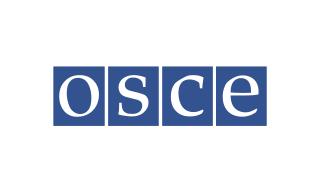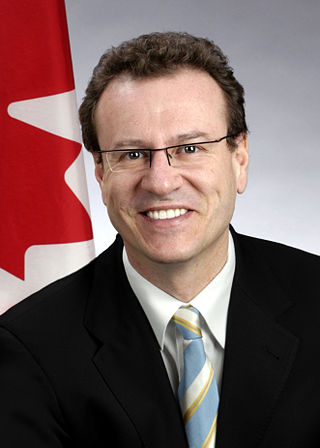
The Organization for Security and Co-operation in Europe (OSCE) is a regional security-oriented intergovernmental organization comprising member states in Europe, North America, and Asia. Its mandate includes issues such as arms control, the promotion of human rights, freedom of the press, and free and fair elections. It employs around 3,460 people, mostly in its field operations but also in its secretariat in Vienna, Austria, and its institutions. It has observer status at the United Nations.
Democratic capitalism, also referred to as market democracy, is a political and economic system. It integrates resource allocation by marginal productivity, with policies of resource allocation by social entitlement. The policies which characterise the system are enacted by democratic governments.

Borys Wrzesnewskyj is a Canadian politician who represented the riding of Etobicoke Centre in the House of Commons of Canada. He held the riding from 2004 to 2011 and again from 2015 to 2019. He is a member of the Liberal Party.
The Canadian International Development Agency (CIDA) was a federal Canadian organization that administered foreign aid programs in developing countries. The agency was merged into the Department of Foreign Affairs in 2013 by the federal government under Prime Minister Stephen Harper.

Presidential elections were held in Ukraine on 31 October, 21 November and 26 December 2004. The election was the fourth presidential election to take place in Ukraine following independence from the Soviet Union. The last stages of the election were contested between the opposition leader Viktor Yushchenko and incumbent Prime Minister Viktor Yanukovych from the Party of Regions. It was later determined by the Ukrainian Supreme Court that the election was plagued by widespread falsification of the results in favour of Yanukovych.

New Brunswick Community College (NBCC) is a community college located throughout various locations in New Brunswick, Canada including Moncton, Miramichi, Fredericton, Saint John, St. Andrews, and Woodstock.
The International Foundation for Electoral Systems (IFES) is an international, non-profit organisation founded in 1987. Based in Arlington, Virginia, United States, the organization assists and supports elections and electoral stakeholders. Since 1987, IFES has worked in 145 countries and has programs in more than 50 countries throughout Asia-Pacific, Africa, Eurasia, the Middle East, and North Africa, and the Americas.

The National Democratic Institute (NDI), officially known as the National Democratic Institute for International Affairs, is a non-profit American NGO which states its mission as "support[ing] and strengthen[ing] democratic institutions worldwide through citizen participation, openness and accountability in government".
Open-source governance is a political philosophy which advocates the application of the philosophies of the open-source and open-content movements to democratic principles to enable any interested citizen to add to the creation of policy, as with a wiki document. Legislation is democratically opened to the general citizenry, employing their collective wisdom to benefit the decision-making process and improve democracy.
Colleges and Institutes Canada is a national association formed in 1972 to represent the interests of its member institutions to government and industry. Membership is voluntary and open to publicly-funded community colleges in Canada or institutions that may also be referred to as an institute of technology, CEGEP, or university with a college mandate. As of 2023, CICan has 141 member institutions.

Canada–Ukraine relations are the bilateral ties between Canada and Ukraine.
Journalists for Human Rights (JHR) is Canada's largest international media development organization. Based in Toronto, Ontario, Canada, JHR was founded in 2002 by Benjamin Peterson and Alexandra Sicotte-Levesque in 2002. JHR's mission is to inspire and mobilize media to cover human rights stories in ways that help communities help themselves. The organization's vision is for everyone in the world to access their human rights.

Benin and the United States have had an excellent history of relations in the years since Benin embraced democracy. The U.S. Government continues to assist Benin with the improvement of living standards that are key to the ultimate success of Benin's experiment with democratic government and economic liberalization, and are consistent with U.S. values and national interest in reducing poverty and promoting growth. The bulk of the U.S. effort in support of consolidating democracy in Benin is focused on long-term human resource development through U.S. Agency for International Development (USAID) programs.
NetCorps was a volunteer-organizing coalition consisting of nine Canadian non-governmental organizations (NGOs), funded by the Canadian International Development Agency (CIDA) and managed by the NetCorps coordination unit. Through the program, the organizations created international information and communication technologies (ICT) internships in developing countries around the world. Interns typically participated in six-month programs, leaving between August and November for host organizations in the placement countries. Positions were limited to 19–30-year-old Canadian citizens or landed immigrants who had "appropriate information and communication technologies skills". Typical duties included creating webpages, developing databases, computer networking, setting up hardware, preparing manuals and other documentation, and general-to-advanced computer instruction.

Canada–Haiti relations are relations between Canada and the Republic of Haiti. They are the only independent French-speaking countries in the Americas. During the unsettled period from 1957 to 1990, Canada received many Haitian refugees, who now form a significant minority in Quebec. Canada participated in various international interventions in Haiti between 1994 and 2004, and continues to provide substantial aid to Haiti. Both nations are members of the Organisation internationale de la Francophonie, Organization of American States and the United Nations.
The Electoral Institute for Sustainable Democracy in Africa, or EISA, is an organization founded in 1996 in Johannesburg to "promote credible elections, participatory democracy, human rights culture and the strengthening of governance institutions for the consolidation of democracy in Africa."
The Center for Policy Studies in Ukraine is a non-governmental think tank in Ukraine, headquartered in Lviv. The Center deals with international politics, civil society, NGOs, education, politics, regional policy and legislature; it also conducts conferences and seminars. The Center for Policy Studies was established in 1994 and officially registered in 1997. One of its key objectives is to utilize the creative potential of the graduates and students of social sciences and humanities at Lviv University and other universities in Lviv and the region to promote democratic principles and civil society in Ukraine. The center works to assist the development of a network of teaching staff and innovative educational areas, and to implement activities aimed at developing professional, independent media to document the changing political environment of Ukraine.

Ash Center for Democratic Governance and Innovation, formerly known as the Ash Institute, was established in 2003 and is part of the Harvard Kennedy School at Harvard University in Cambridge, Massachusetts, in the United States.
The Institute of Economic Affairs (IEA), Ghana, is a public policy think tank based in Accra, Ghana. It is known to be Ghana's premier public policy institute. It was founded by a Ghanaian economist, Dr. Charles Mensa in 1989 at a time when the country was governed by a military regime. The IEA was set up as an independent, non-government institution dedicated to the establishment and strengthening of a market economy and a democratic, free and open society. The IEA supports research, promotes and publishes studies on economic, socio-political and legal issues in order to enhance understanding of public policy.

Anita M. Vandenbeld is a Canadian politician, who was elected to represent the riding of Ottawa West—Nepean for the Liberal Party of Canada in the House of Commons of Canada in the 2015 Canadian federal election. She was re-elected in the same riding in 2019, and re-elected in 2021.









